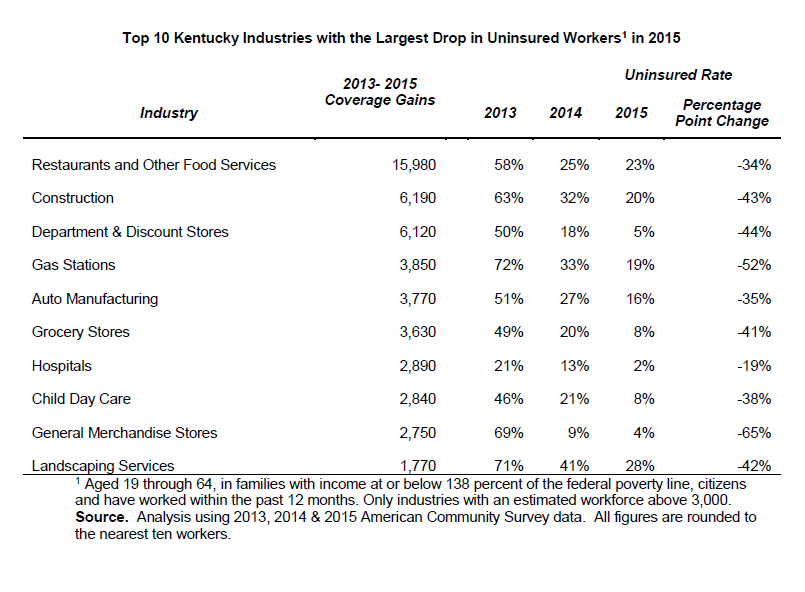Thousands of Kentuckians who work low wage jobs at restaurants, on construction sites and at retail stores are among those who have gained health insurance because of Kentucky’s decision to expand Medicaid under the Affordable Care Act (ACA), newly-available Census data show. These workers’ access to care is now at risk if the ACA is repealed or Kentucky takes steps backward on the expansion, harming our economy and the health of our state.
Over half of all Medicaid eligible Kentuckians who gained health insurance between 2013 and 2015 held a job, according to American Community Survey data. When you factor in the same low-income Kentuckians who held a job at some point in the past five years that proportion grows to nearly 4 in 5.
The biggest industries where workers have gained coverage are as follows:
- Restaurant and food services, where there are 15,980 more insured workers. Whereas 58 percent of workers in that sector whose family incomes were below the eligibility level for Medicaid under the expansion were uninsured in 2013, only 23 percent were uninsured in 2015. 1
- Construction, with 6,190 workers gaining health insurance and an uninsured rate that fell from 63 percent to 20 percent.
- Department and discount stores, with 6,120 workers gaining health insurance and an uninsured rate that fell from 50 percent to 5 percent.
The next largest groups of workers with coverage gains were those employed in gas stations, auto manufacturing, grocery stores, hospitals, children’s day care, general merchandise stores and landscaping services (see chart on following page).
Kentucky is a national leader in health coverage gains under the Affordable Care Act. 2 While most of those who are gaining insurance are working, they are in jobs that do not offer them coverage. The share of Kentucky workers who had access to health insurance through their employer has gradually fallen from 70 percent in 1980-1982 to only 53.7 percent in 2011-2013. 3 Medicaid, as well as access to private insurance with the help of tax credits, are helping fill the gaps left by an eroding employer-based insurance system.
Kentucky ranks near the bottom on many health measures, making our decision to expand Medicaid that much more important. Recent studies from the Chan School of Public Health at Harvard show progress: Kentuckians are getting more preventative screenings and care, more care for chronic conditions that otherwise worsen more severely over time and even report having better health.4 Their ability to go to the doctor for regular checkups and when sick means the rest of the state can stay healthier.
Those gains are seriously threatened with the newly-elected president and Congress promising to repeal the Affordable Care Act, which provided for Medicaid to be expanded in the first place. Doing so would result in an estimated 29.8 million fewer Americans having health insurance, and millions more being vulnerable to many of the harmful practices insurers are currently barred from using.5 Also, the recent request to make changes to Kentucky’s Medicaid program puts the state’s gains at risk. With barriers to coverage, reduced benefits and administrative complexity that both adds unnecessary cost and confusion for beneficiaries, much of the progress we’ve seen would start to move backward under such a plan. 6
It’s important that federal and state lawmakers protect the advances we are making in health care for the sake of workers and the entire economy.
- Report looks at citizens ages 19 through 64 in families with income at or below 138 percent of the federal poverty line who have worked within the past twelve months. Citizens are the focus because the Medicaid expansion is generally unavailable for non-citizens. ↩
- US Census Bureau, “Health Insurance Coverage in the United States: 2015,” September 2016, https://www.census.gov/library/publications/2016/demo/p60-257.html. ↩
- Economic Policy Institute analysis of Current Population Survey March supplement. ↩
- B.D. Sommers, R.J. Blendon, & E.J. Orav, “Both the ‘Private Option’ and Traditional Medicaid Expansions Improved Access to Care for Low-Income Adults,” Health Affairs, January 2016 35(1):96–105, http://content.healthaffairs.org/content/35/1/96.full?keytype=ref&siteid=healthaff&ijkey=A6hBKcGzMrX2A. B.D. Sommers, R.J. Blendon, E.J. Orav & A.M. Epstein, “Changes in Utilization and Health among Low-Income Adults After Medicaid Expansion or Expanded Private Insurance,” JAMA Internal Medicine, August 8, 2016, http://archinte.jamanetwork.com/article.aspx?articleid=2542420. ↩
- L. Blumberg, M. Buettgens, & J. Holahan, “Implications of Partial Repeal of the ACA through Reconciliation,” Urban Institute, December, 2016, http://www.urban.org/research/publication/implications-partial-repeal-aca-through-reconciliation. ↩
- Dustin Pugel & Jason Bailey, “Proposed Medicaid Waiver Would Reduce Coverage and Move Kentucky Backward on Health Progress,” Kentucky Center for Economic Policy, October 7, 2016, https://kypolicy.org/wp-content/uploads/2016/07/1115-Medicaid-Waiver-Federal-Comments-KCEP.pdf. ↩




